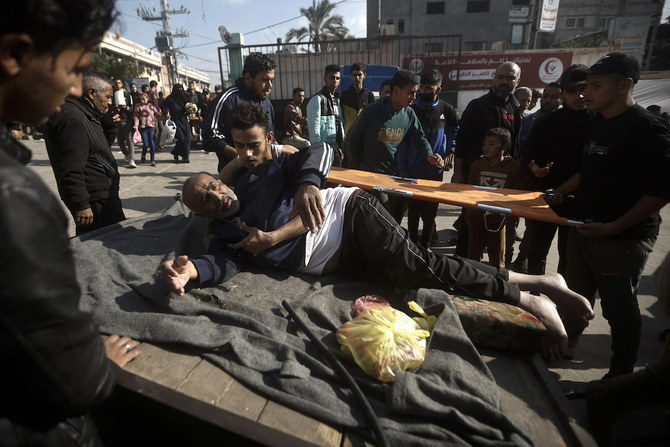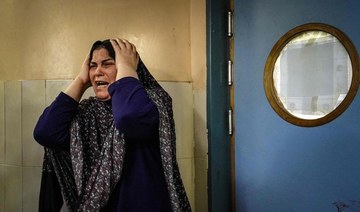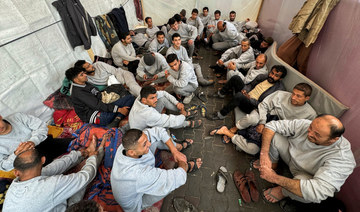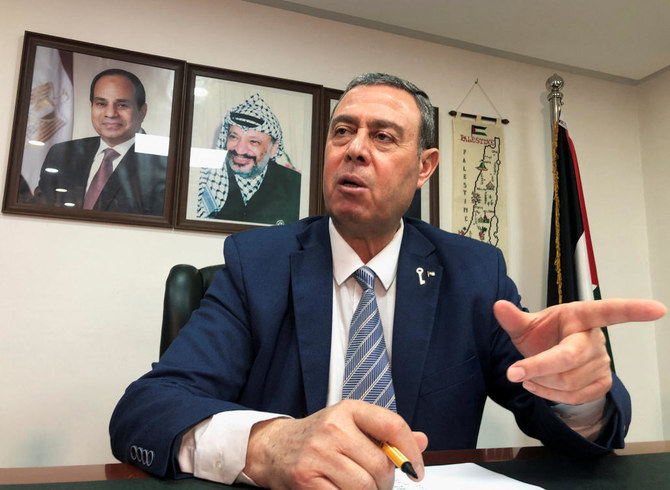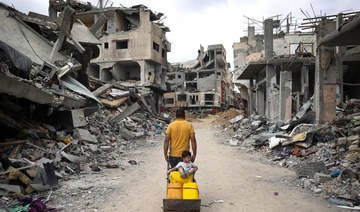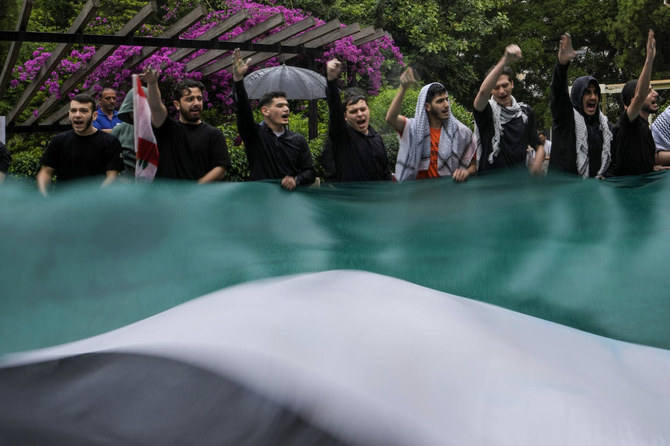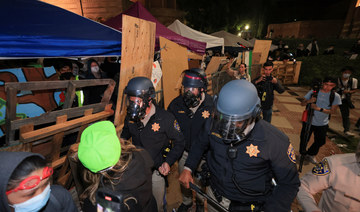DEIR AL-BALAH: Israeli warplanes struck two urban refugee camps in central Gaza on Saturday, as the Biden administration approved a new emergency weapons sale to Israel despite persistent international cease-fire calls over mounting civilian deaths, hunger and mass displacement in the enclave.
Israel says it is determined to pursue its unprecedented air and ground offensive until it has dismantled Hamas, a goal viewed by some as unattainable because of the militant group’s deep roots in Palestinian society. The United States has shielded Israel diplomatically and has continued to supply weapons.
Israel argues that ending the war now would mean victory for Hamas, a stance shared by the Biden administration which at the same time urged Israel to do more to avoid harm to Palestinian civilians.
The war, triggered by the deadly Oct. 7 Hamas attack on southern Israel, has displaced some 85 percent of the Gaza Strip’s 2.3 million residents, sending swells of people seeking shelter in Israeli-designated safe areas that the military has nevertheless also bombed. That has left Palestinians with a harrowing sense that nowhere is safe in the tiny enclave.
Residents in the urban refugee camps of Nuseirat and Bureij, two recent hot spots of combat, reported Israeli airstrikes overnight and into Saturday.
Nuseirat resident Mustafa Abu Wawee said a strike hit the home of one of his relatives, killing two people.
“The (Israeli) occupation is doing everything to force people to leave,” he said over the phone while searching along with others for four people missing under the rubble. “They want to break our spirit and will but they will fail. We are here to stay.”
A second strike late Friday in Nuseirat targeted the home of a journalist for Al-Quds TV, a channel linked to the group Islamic Jihad whose militants also participated in the Oct. 7 attack. The channel said the journalist, Jaber Abu Hadros and six members of his family were killed.
Bureij resident Rami Abu Mosab said sounds of gunfire echoed across the camp overnight, followed by heavy airstrikes Saturday.
With Israeli forces pushing deeper into Khan Younis and the camps of central Gaza, tens of thousands of Palestinians streamed into the already crowded city of Rafah at the southernmost end of Gaza in recent days.
Drone footage showed a vast camp of thousands of tents and makeshift shacks set up on what had been empty land on Rafah’s western outskirts next to UN warehouses. People arrived in Rafah in trucks, in carts and on foot. Those who did not find space in the already overwhelmed shelters put up tents on roadsides slick with mud from winter rains.
The State Department said Friday that Secretary of State Antony Blinken told Congress he approved a $147.5 million sale for equipment, including fuses, charges and primers, that is needed for 155 mm shells Israel bought previously.
It marked the second time this month that the Biden administration is bypassing Congress to approve an emergency weapons sale to Israel.
The department cited the “urgency of Israel’s defensive needs” as a reason for the approval, and argued that “it is vital to US national interests to ensure Israel is able to defend itself against the threats it faces.”
The emergency determination means the purchase will bypass the congressional review requirement for foreign military sales. Such determinations are rare, but not unprecedented, when administrations see an urgent need for weapons to be delivered without waiting for lawmakers’ approval.
Blinken made a similar decision on Dec. 9 to approve the sale to Israel of nearly 14,000 rounds of tank ammunition worth more than $106 million.
Both moves have come as President Joe Biden’s request for a nearly $106 billion aid package for Ukraine, Israel and other national security needs remains stalled in Congress, caught up in a debate over US immigration policy and border security. Some Democratic lawmakers have spoken of making the proposed $14.3 billion in American assistance to its Mideast ally contingent on concrete steps by Israeli Prime Minister Benjamin Netanyahu’s government to reduce civilian casualties in Gaza during the war with Hamas.
More than a week after a UN Security Council resolution called for the unhindered delivery of aid at scale across besieged Gaza, conditions have only worsened, UN agencies warned.
Aid officials said the aid entering Gaza remains woefully inadequate. Distributing goods is hampered by long delays at two border crossings, ongoing fighting, Israeli airstrikes, repeated cuts in Internet and phone services and a breakdown of law and order that makes it difficult to secure aid convoys, they said.
Nearly the entire population is fully dependent on outside humanitarian aid, said Philippe Lazzarini, head of UNRWA, the UN agency for Palestinian refugees. A quarter of the population is starving because too few trucks enter with food, medicine, fuel and other supplies — sometimes fewer than 100 trucks a day, according to UN daily reports.
UN monitors said operations at the Israeli-run Kerem Shalom crossing halted for four days this week because of security incidents, such as a drone strike and the seizing of aid by desperate Gaza residents.
They said the crossing reopened Friday, and that a total of 81 aid trucks entered Gaza through Kerem Shalom and the Rafah crossing on the Egyptian border — a fraction of the typical prewar volume of 500 trucks a day.
Meanwhile, the World Health Organization warned that the spread of disease is accelerating, particularly in southern Gaza, where hundreds of thousands have crammed into an ever-shrinking area to flee airstrikes and advancing Israeli ground forces. The agency reported more cases of upper respiratory infections, diarrhea, lice, scabies, chickenpox, skin rashes and meningitis.
100 Palestinians killed and 158 wounded in Israeli strikes in central Gaza during the past 24 hours, a senior health official said.
The war has already killed over 21,500 Palestinians, most of them women and children, according to the Health Ministry in the Hamas-ruled territory. Its count does not distinguish between civilians and combatants. Israel holds Hamas responsible for civilian deaths and injuries, saying the militants embed themselves within civilian infrastructure.
Israeli officials, meanwhile, have vowed to bring back more than 100 hostages still held by the militants after their Oct. 7 attack on southern Israel that triggered the war. The assault killed some 1,200 people, mostly civilians.
The military says 168 of its soldiers have been killed since the ground offensive began.



